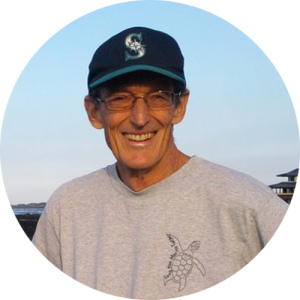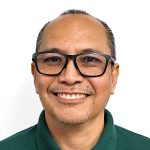Board of Trustees
In response to the deterioration of coastal resources in the Philippines, the Coastal Conservation and Education Foundation was formed by a group of concerned and talented individuals to address some critical marine conservation needs of the country.

Alan White
President
A world renown scientist and a pioneer of coastal resource management in the Philippines. Formerly the Chief of Party of the Sustainable Ecosystems Advanced (SEA) Project in Jakarta, Indonesia, supported by USAID. He received his Masters in Management from the School for International Training in Vermont and his doctorate in Geography from the University of Hawaii, U.S.A. He specializes in research and coastal resource management.

Joey Gatus
Board Secretary
He is a Masters in Biology with work experience relating to ecosystem restoration using nature-based solution such as MPA establishment, coral reef restoration, carrying capacity institutionalization on coastal tourism sites, environmental monitoring and resource valuation, community-based coastal fisheries resource management and policy development pertaining to conservation governance.

May Elizabeth Ybañez
Treasurer
She is the former Executive Director of the prestigious and multi-awarded Cebu Chamber of Commerce & Industry Inc (CCCI). She is a trustee of the Coastal Conservation Education Foundation and former President of the Cebu Biodiversity Conservation Foundation and the St. Theresa’s Alumnae Board. She has hands-on experience in organizing and mobilizing the various TVET Clusters of various industries i.e. tourism, construction and food manufacturing in partnership with the AFOS Foundation for Entrepreneurial Development. Currently, she is an independent consultant of various private companies and organizations.

Patrick Christie
Coastal Resource Management Advisor
Dr. Patrick Christie is a professor at the School of Marine Affairs in the University of Washington in Seattle, Washington, U.S.A. Dr. Christie received his Masters in Conservation Biology and his Doctorate in Natural Resources and Environment in the University of Michigan, U.S.A. Dr. Christie’s current research projects consider the human dimensions of marine protected area networks, tribal perspectives on the state of Puget Sound, and the feasibility of marine ecosystem-based management in tropical contexts. He was recently selected as a Pew Fellow in Marine Conservation. He has led various comparative, socio-ecological research projects in the Philippines and Indonesia on the practice of marine resource management.

Alan Roland Thomas
Institutional Development Advisor
Alan Thomas is the Director of UNICO Conservation Foundation and currently the C.E.O. of BlueQ- digitizing qualification for organizations and individuals. He mentors and consults with software businesses to help them navigate the strategic, operational and financial challenges they face as they grow. He has over 30 years of experience in the software industry leading businesses in the US and Australia including public, private and not for profit board positions.

Marlito Nolledo Guidote
Marketing Adviser
Marlito’s involvements have included being a Coastal Law Enforcement Specialist of the Coastal Resource Management Project (USAID) in 2005, Policy and Enforcement Advisor under the Fisheries Improved for Sustainable Harvest Project (USAID) in 2010 and formerly, the Deputy Chief of Party for the Fisheries Improved for Sustainable Harvest Project (USAID). He is a consultant focusing on governance, law enforcement and communication. Currently, he is the Deputy Chief of Party of Sustainable Interventions for Biodiversity, Oceans, and Landscapes (SIBOL) Project.

Jennifer Ramos
Member
She specializes in legal and environmental advocacy. She was involved in drafting case memos with legal strategies approved by Oceana’s Board, resulting in Supreme Court lawsuits to halt an airport project and enforce vessel monitoring and plastic ban policies. She also prepared briefing papers on fisheries policies and participated in public hearings. Additionally, she led campaigns to prevent dump-and-fill projects in Manila Bay and restore mangrove forests, collaborating with fisherfolk, NGOs, academic institutions, and private sector entities like Manila Bay hotels and yacht clubs.

Evangeline Eban-White
Member
She has a Bachelor of Science degree in Commerce with a major in Banking and Finance at Saint Paul College of Manila, Philippines. She also has units in Business Administration and Accounting at the Rhode Island State Business School, U.S.A. She has been managing the Saving Philippine Reefs Research Expeditions annually since 1992 through the support of Earthwatch Expeditions and expedition volunteers.
The Coastal Conservation and Education Foundation (CCEF), founded in 1998, helps conserve coastal and marine resources for the benefit of coastal residents and encourages all coastal stakeholders to become good stewards of the marine life and coastal ecosystems they depend on. In our 25 years, we have undertaken and supported hundreds of projects to make this vision a reality by working with many partners to address a variety of challenges. Our partners range from municipal governments, fishing communities and NGOs to national agencies, academic institutions and donors. Our mission is clearly aimed to Sustain Coasts through Involved Communities.
CCEF works in an adaptive manner so that it can achieve positive outcomes and build resilience in response to current needs. In recent years CCEF has responded quickly to mitigate major typhoon damage to reefs and coastal communities by assessing the damage and assisting with plans for restoration of coastal habitats and ecosystems as well as guiding the human aspects of recovery. Because CCEF, in all projects, works directly with communities to support their marine conservation, waste management, tourism and livelihood development, it is really building community and environmental resilience in a variety of forms.
The longer-term vision of CCEF is that more and more area come under effective management so that benefits from coral reef, mangrove, seagrass and associated coastal ecosystems can be maximized to the benefit of fisheries, tourism and other direct products they provide to people living in the area. Having effective marine protected areas and well designed and implemented integrated coastal management plans is key to the success of CCEF and its partners.
While the projects of CCEF are described in our website, I want to highlight the ability of CCEF to work across multiple dimensions as required by the ecosystem-based management in Danajon Bank off northern Bohol. The Danajon Bank double barrier reef is too large and diverse to be managed by any one agency or single group of stakeholders. And so it is that thanks to the coordinating work of CCEF and others, the various towns are attending to the environmental management of this large and valuable resource area.
Significantly, they are proceeding to protect their local food security through the collective conservation and management of their marine areas. CCEF has been able to refine this approach after working with clusters of municipalities in southern Cebu to achieve collaborative fisheries and marine protected areas management that is essential to address the larger issues of coastal law enforcement, mobile illegal fishers and oceanographic variability. Such cooperative undertakings focus on activities that jointly address the common resource threats among the municipal jurisdictions, such as degradation of key habitats, overfishing, and dwindling fish stocks.

President, CCEF
We are proud to announce the employment of a new Executive Director for the CCE Foundation. Mr. Glenn Labrado started his new position with CCEF on July 1, 2025. Mr. Labrado brings a wealth of experience to the Foundation following his more than 20 years working in the development and conservation sectors in the Philippines with donor organizations, NGOs, and as an independent consultant. Glenn has led non-government organizations working on marine and environmental conservation and has managed numerous projects that led to productive outcomes. Glenn also has extensive experience in designing, development and implementation results-based monitoring and evaluation systems that supports high-quality reporting of project results. He has solid experience in program/project development, grants writing and management, fund raising and donor relations. Glenn is extremely well suited to guide CCEF and its various programs.
Glenn is taking over the Executive Director position from Ms. Evelyn Deguit who as we all know has done an excellent job of managing CCEF for the past 2 years. The good news is that Evelyn is not resigning from CCEF but desires to work less than full time and will thus remain employed to assist Glenn in his transition and to manage particular projects as appropriate.
We encourage you to welcome Mr. Labrado to his new position in CCEF and to interact with him freely to discuss business affairs and activities of mutual interest now or anytime in the future. Our office address is the same as noted on this letter and the email contacts for Glenn are executive_director@coast.ph or g.r.labrado@coast.ph.


